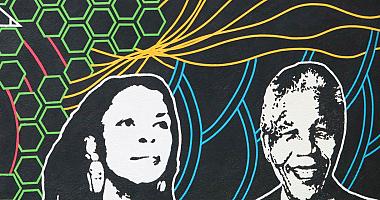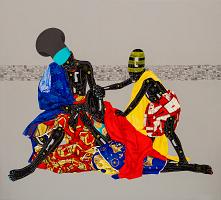MA Gender, Media & Culture
Content navigation menu
Why study MA Gender, Media & Culture at Goldsmiths
This programme introduces you to recent debates on gender in the disciplines of sociology and media, as well as to the interdisciplinary domains of feminist social and cultural theory. There are a range of topic choices available, including embodiment, feminist methods, media and sexuality, and postcolonialism.
- You'll be taught by experts in Sociology and Media, Communications and Cultural Studies, as well as the Centre for Feminist Research.
- You’ll develop cutting-edge critical skills in relation to cultural approaches to gender formation and gender theory.
- The degree will provide you with a solid understanding of the importance of epistemology and methodology for the evaluation of empirical investigations of gender formations.
- You’ll be introduced to, and trained in, the key socio-cultural methods for the study of gender in the contemporary world – including methods for the study of visual culture, the body and affect, and memory.
- You’ll benefit from tailored supervision in the development of a research project on a specific topic.
- As an interdisciplinary degree, this programme draws from a range of areas, including sociology, media and communications, humanities, science and technology studies, and philosophy.
- You’ll become part of a lively research environment in a politically active university.
- Media, Communications and Cultural Studies at Goldsmiths has been ranked 2nd in the UK for 'world-leading or internationally excellent' research (Research Excellence Framework, 2021) and 16th in the world (3rd in the UK) in the 2024 QS World Rankings for communication and media studies.
Contact
If you have specific questions about the degree, contact Dr Nirmal Puwar.
Length
1 year full-time or 2 years part-time
Fees
Home - full-time: £11800
Home - part-time: £5900
International - full-time: £23000
Schools
Global Change
Media, Communications and Cultural Studies
Subject
Watch videos about your course
What you'll study
You'll complete the following compulsory modules:
| Module title | Credits |
|---|---|
| Introduction to Feminism and Cultural Theory | 30 credits |
| Gender Affect and the Body | 30 credits |
| Dissertation | 60 credits |
How you'll be assessed
The assessment consists of coursework, extended essays, presentations, practice-based projects or essays/logs, group projects, reflective essays, and experimental proposals.
Careers
Previous graduates have embarked on professional careers globally in:
- Social research
- Think tanks
- The arts and cultural sectors
- Government and public administration
- Development
- Human rights
- NGOs
- Media and communications
They have also progressed to PhD study.
Skills
Graduates from this programme gain conceptual and methodological knowledge of the key concepts and debates in the study of gender and culture; the skills of critical analysis; the ability to distinguish and appraise a range of socio-cultural research methodologies; the skills to design and develop a research project; and the ability to recognise and account for sensitive ethical issues relating to research and representation.
The two core courses provide you with the necessary skills to understand the relationships between early debates in the fields of gender studies, feminist theory and feminist cultural theory, and the ability to critically engage with new developments in these fields. Furthermore, you will gain a critical appreciation of the role and place of the body and affect in the development of feminist cultural theory and gender theory, and the challenges that contemporary socio-cultural changes bring to the theorisation of the body.
What our students say


Suggested reading
Suggested preliminary readings:
- E (1990) Sexing the Self: Gendered Positions in Cultural Studies. Routledge
- Marshall B and A Witz (2004) Engendering Social Theory. Open University Press
- Grace Cho (2008) Haunting the Korean Diaspora: Shame, secrecy silence and the Forgotten War. Minnesota Press
- A (2003) Archive of Feelings: Trauma, Sexuality and Lesbian Public Cultures. Duke University Press.
- Patricia Elliot (2010) Debates in Transgender, Queer and Feminist Theory
- James, J. and T.D. Sharpley-Whiting (Eds.) (2000)The Black Feminist Reader. Oxford: Blackwell Publishers.
- Haraway, D (1991) Simians, Cyborgs and Women: The Reinvention of Nature. Routledge.
- Butler, J (1990) Gender Trouble. Routledge.
- Colebrook, C (2004) Gender. Palgrave.
- Fraser, M. and Greco, M (2005) The Body Reader. Routledge.
- Gill, R (2007) Gender and the Media. Polity.
Relevant journals
- European Journal of Women’s Studies (Sage)
- European Journal of Cultural Studies (Sage)
- European Journal of Social Theory (Sage)
- Feminist Economics (Routledge)
- Feminist Media Studies (Routledge)
- Feminist Review (Routledge)
- Feminist Theory (Sage)
- Feminism and Psychology (Sage)
- Feminist Studies (Jstor)
- Gender and Society (Sage)
- Gender, Technology and Development (Sage)
- Journal of Gender Studies (Routledge)
- Media, Culture and Society (Sage)
- Sexualities (Sage)
- Signs (Jstor)
- Sociological Methods & Research (Sage)
- Sociology (Sage)
- Subjectivities (Palgrave)
- Theory, Culture and Society (Sage)
Staff
Staff who teach on this programme include:
- Nirmal Puwar, Programe Convenor, Lecturer in Sociology
- Louise Chambers, Programme Co-Convenor, Lecturer in Communications
- Akanksha Mehta, Lecturer in Communications
- Lisa Blackman, Professor in Communications
- Nina Wakeford, Reader in Sociology
Research
The Centre for Feminist Research offers a symbolic and intellectual home for the MA Gender, Media and Culture, co-convened by Media, Communications and Cultural Studies and Sociology. It provides a coordinating hub for feminist work at Goldsmiths, organising seminars and conferences.
The MA programme is supported by the wide variety of international events, talks and screenings organised by the Centre. Students are encouraged to become involved in these activites. Find out about upcoming events and activites.
There are a number of off-site visits organised throughout the year, including trips to art galleries, the London Film Festival and a feminist tour of Westminster.
Entry requirements
You should have (or expect to be awarded) an undergraduate degree of at least second class standard in a relevant/related subject.
You might also be considered for some programmes if you aren’t a graduate or your degree is in an unrelated field, but have relevant experience and can show that you have the ability to work at postgraduate level.
We are open to unconventional routes through education.
International qualifications
We accept a wide range of international qualifications. Find out more about the qualifications we accept from around the world.
If English isn’t your first language, you will need an IELTS score (or equivalent English language qualification) of 6.5 with a 6.5 in writing and no element lower than 6.0 to study this programme. If you need assistance with your English language, we offer a range of courses that can help prepare you for postgraduate study.
Fees and funding
Annual tuition fees
These are the PG fees for students starting their programme in the 2025/2026 academic year.
- Home - full-time: £11800
- Home - part-time: £5900
- International - full-time: £23000
If your fees are not listed here, please check our postgraduate fees guidance or contact the Fees Office, who can also advise you about how to pay your fees.
It’s not currently possible for international students to study part-time under a student visa. If you think you might be eligible to study part-time while being on another visa type, please contact our Admissions Team for more information.
If you are looking to pay your fees please see our guide to making a payment.
Funding opportunities
First in Family Fee Waiver
Media, Communications and Cultural Studies will be awarding a limited number of competitive 100% fee waivers for the academic session 2025 – 26 for students who are the first in their family to attend university and who demonstrate considerable academic potential.
Find out more and apply for the First in Family Fee Waiver.
Aziz Foundation Scholarship
Up to nine full fee waiver scholarships are available. The scholarship is open to British Muslims who are Masters offer holders with specific career aspirations, including a career in media or journalism.
Find out more about the Aziz Foundation Scholarship.
Explore the Goldsmiths scholarships finder to find out what funding you may be eligible for.
If you are a UK student you may be eligible for a postgraduate loan.
Meanwhile our Careers Service can also offer advice on finding work during your studies.
Paying your fees
Find out about paying your tuition fees.
Additional costs
In addition to your tuition fees, you'll be responsible for any additional costs associated with your course, such as buying stationery and paying for photocopying. You can find out more about what you need to budget for on our study costs page.
There may also be specific additional costs associated with your programme. This can include things like paying for field trips or specialist materials for your assignments. Please check the programme specification for more information.
How to apply
You apply directly to Goldsmiths using our online application system.
To complete your application, you will need to have:
- Details of your academic qualifications
- The email address of your referee who we can request a reference from, or alternatively a copy of your academic reference
- Copies of your educational transcripts or certificates
- A personal statement
You'll be able to save your progress at any point and return to your application by logging in using your username/email and password.
When to apply
We accept applications from October for students wanting to start the following September.
We encourage you to complete your application as early as possible, even if you haven't finished your current programme of study. It's very common to be offered a place that is conditional on you achieving a particular qualification.
Late applications will only be considered if there are spaces available.
If you're applying for funding, you may be subject to an earlier application deadline.
Further guidance
Read our guide to applying for a postgraduate degree at Goldsmiths.




